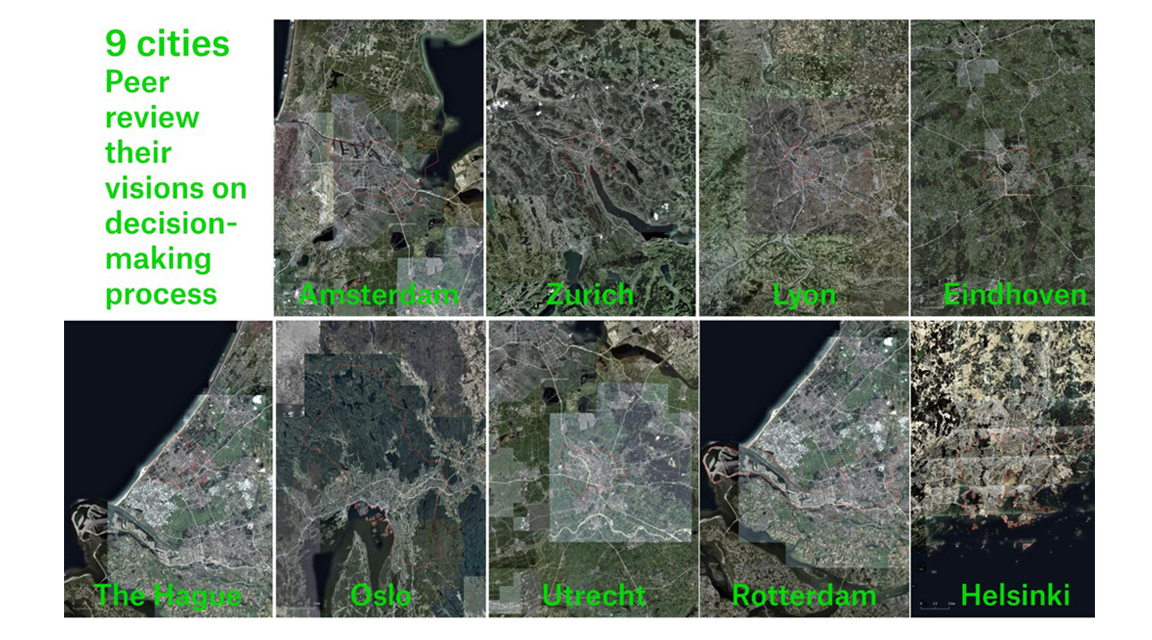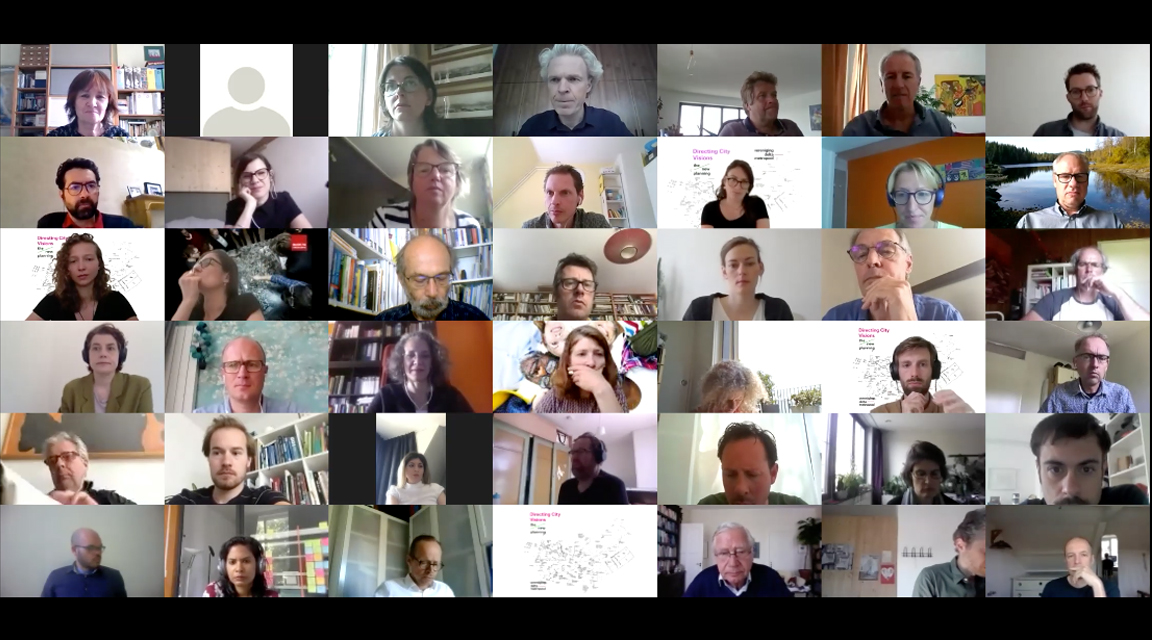What did the cities learn?
Reporting back - Directing City Visions
28 mei 2020
The New Planning Dialogue #05 was organised as a peer review session by Vereniging Deltametropool in collaboration with Amsterdam Municipality via an online Zoom session. On the 8th of May 2020 the online session took place with ten cities of Europe and a wide audience, almost reaching to a hundred, of planners, designers, policymakers and academicians.
Watch full video of the event here
The current pandemic situation led Vereniging Deltametropool to develop and experiment with the online session format, and coincidingly that supported the opportunity to have city representatives and other stakeholders from all around Europe to come together for this peer review session. The need for changes in spatial planning approaches have already become evident during the previous sessions of The New Planning Dialogue, however especially with our current situation in mind 75% of the participants agreed that this is the right time to think of changes.
In “The New Planning Dialogue”, we discuss various scales and subjects to answer the big question, how to effectively plan for the big challenges? In this fifth activity Directing City Visions, we focused the discussion on the city scale and the subject of decision making. Keeping this the foundation of the discussion, we took up city specific subjects and how decision-making process can be improvised and position in a more participative approach? Amsterdam, Rotterdam, The Hague, Utrecht, Eindhoven, Helsinki, Lyon, Zurich, Oslo and Paris joined the discussion. During this online session the cities were paired with each other along with a smaller audience to share their visions and action plans, to get inspired and learn from each other.
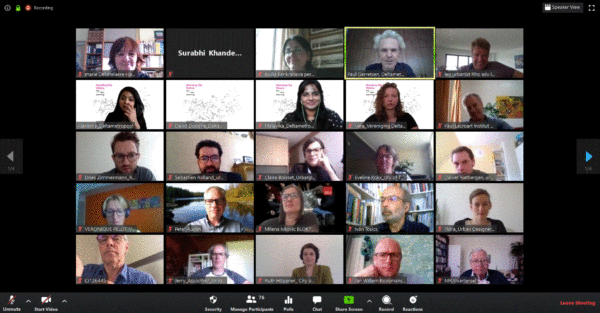
Introduction
On the Friday afternoon, the online session with around 90 participants, was divided into 3 parts; introduction and keynote with all participants together; four breakout sessions with city pairs dividing the participants into smaller groups and the conclusion and borrel.
Paul Gerretsen welcomed with a short introduction addressing the subject of spatial planning in the Netherlands and how the mindset towards spatial planning has been changing over time. At present the focus is on the enormous societal and environmental challenges that we are facing in the living environment, such as climate adaption, energy transition, societal challenges to name a couple. For cities to be able to realize an effective planning approach coordination and collaboration between different municipalities as well as strengthening the relation with local, regional and national scale is necessary.
The introduction was supported by a brief talk with Paul Lecroart (L’institut Paris Region), who addressed the topic of ‘City making in challenging times’. Through a short presentation, based on the examples of the book “Cities: Change the World” from cities around the world, such as New York, London, Medellin and Seoul, were provided to point out the different approaches these cities have implemented. And again, stressing the importance of the need for new instruments and collaboration between cities, on a regional and inter-regional scale. You can follow this link to read the book and learn more about the various instruments and approaches being implemented around the world.
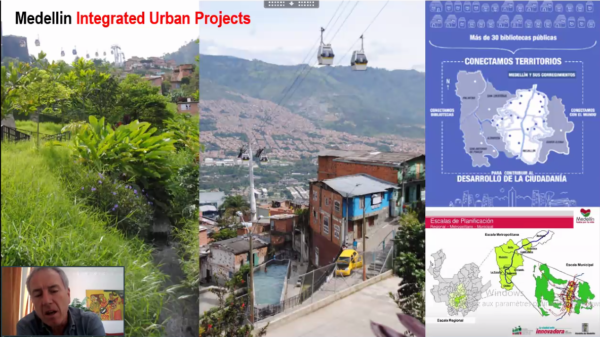
Followed up with a keynote presentation by Erik Pasveer (City of Amsterdam) about ‘Decision making in challenging times’. He was the right person to provide an overview of peer review between cities with his previous experiences in working at the city of The Hague. Erik provided a structured overview and comparison of Amsterdam’s former and current city vision. During the presentation it was emphasized that city planning is not an objective or scientific process but rather about participation, inclusion and bringing together different stakeholders. However, Erik also posed several questions that need to be discussed in the current paradigm of city planning, for example what method to be used for democratic planning or smart city design? Or which agenda should be focused upon, growth or sustainable development? With these statements and questions as food for thought, the participants entered four different breakout rooms to begin with the peer review sessions.
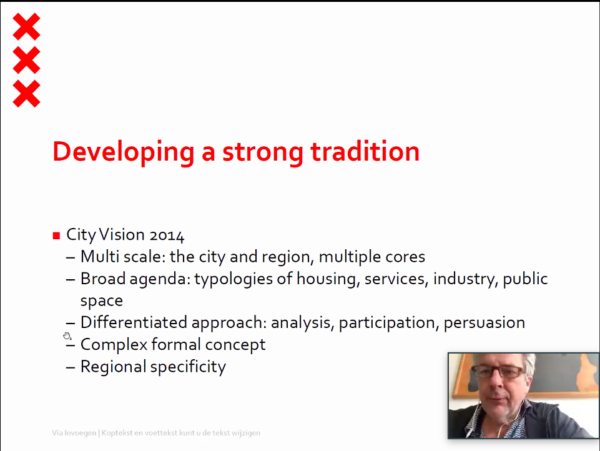
Peer Reviews
Breakout room 1 – Amsterdam and Zurich
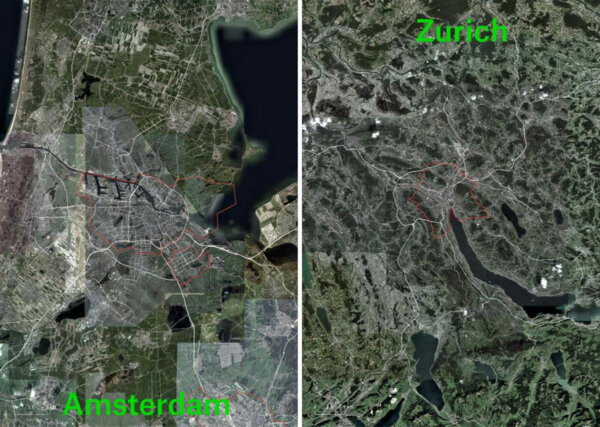
The first city pair of Amsterdam and Zurich was grouped to discuss the economical and political perimeters of decision making in the City Vision development process. The two cities being the largest cities of Netherlands and Zurich always has the spotlight on them and needed the special attention. The city of Amsterdam was represented by Erik Pasveer, Dagmar Keim and Frank van den Beuken. And Anna Schindler represented the city of Zurich. The main theme talked about in this breakout room was on how to bridge the gap from vision to implementation, how do you involve various city stakeholders, and planning in (post) corona times. The current pandemic raises questions around public space, public housing, public transport and public transportation. For both cities the density and compact city growth presents qualities and challenges. In this context a lesson that can be learned from Zürich is to build on your democratic traditions, and while growing also safeguard urban space for industries and circular economy. From the city of Amsterdam we can learn to collaborate with other municipalities to invest in metropolitan landscape and quality of life, and to experiment with new forms and technologies of participation.
Breakout room 2 – Rotterdam, Utrecht and Oslo
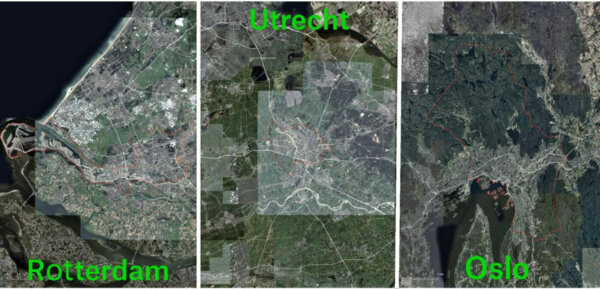
The second breakout room is with three cities, Rotterdam, Oslo and Utrecht had a strong focus on urban healthy living and the relation with the regional scale. These factors led to this group formation with cities under similar challenges. The city of Rotterdam was represented by Gabor Everraert, Dries Zimmermann and Marco den Heijer.. The city of Utrecht was represented by Joost van Faassen. And Peter Austin represented the city of Oslo. The discussion in this breakout room focused on regional collaboration and flexibility related to the development of a healthy and green city. The city of Utrecht stressed an important challenge, how do you define a region, when air pollution, water, landscape, and most of the transportation doesn’t know anything about political boundaries. Next to collaboration on an institutional level it is also important to involve the inhabitants of the city. The city of Rotterdam had an interesting remark on this big paradigm shift, how to involve more people with less information.
Breakout room 3 – The Hague and Lyon
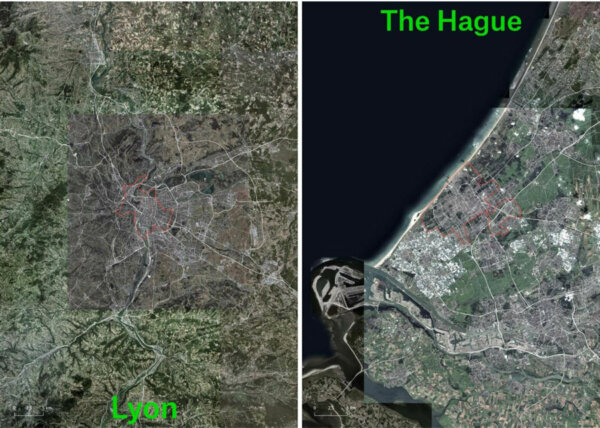
The third breakout room with The Hague and Lyon were paired as both the cities are now in the same stage of the vision making process, assessing the scenarios and building up the right research to provide a strong foundation to the vision. The city of The Hague was represented by Daniel Rietbergen, Marcel Wijermans and Eveline Kokx-van Aalsburg. The city of Lyon was represented by Sebastien Rolland and Claire Boisset. In this breakout room the peer review focused on the development of the city vision and how to get citizens involved. When looking at the development of the city vision it might be necessary to rethink our strategy, it might no longer be possible anymore to make only one plan that tries to bring everything together. From both cities it also became apparent that when involving citizens it is important to build up complexity, you have to start out quite easy and slowly build up the complexity. This can also be on the scale level, for example start out on the neighborhood level and secondly bring all the different groups of stakeholders together. But also, creative tools such as a funny game can be very effective in creating an understandable message.
Breakout room 4 – Eindhoven and Helsinki
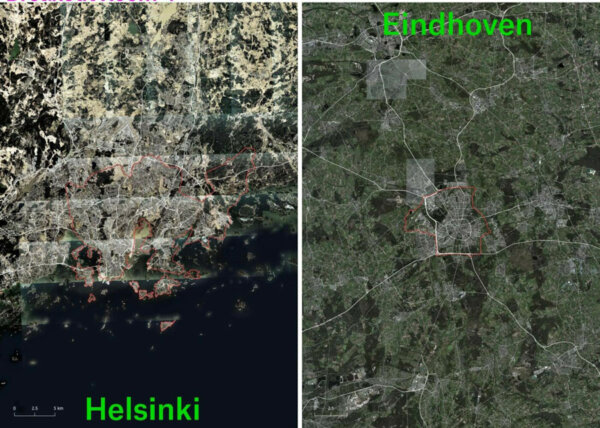
The fourth breakout room was with Eindhoven and Helsinki building up their cities more technologically aware, with the brainport and smart city ideas and they are struggling with the densification approaches.. The city of Eindhoven was represented by Els Coortoum, and the city of Helsinki was represented by Christina Suomi and Niklas Aalto-Setälä. The main topics that were discussed in this breakout room focused on the realtion between economic growth and the smart city approach. During the session it became clear that cities tend to look at their closest neighbors in the pursuit of references and anchor points for their strategies, while it appears to be extremely constructive to look at a much broader range of examples. Cities sitting further away, struggling with similar issues, might provide a refreshing and innovative perspective into the challenges at hand. Another challenge is the way of interacting with the citizens, how to share information and how to get information. For example, Helsinki is more focused on open source provision of data while Eindhoven is much more focused on directly approaching citizens and interacting with them.
Conclusion
After the breakout rooms all participants reconvened together for concluding statements from the different peer review sessions. The moderators of each breakout room formulated couple of strong statements on the city planning approaches that are working well for the cities and in what way they can learn from each other. It is next to impossible to derive some solutions in an hour’s time but we hoped that each city learnt something from each other and got inspired with some new ideas. The emphasis on the role the citizens play in the planning process became very apparent throughout the peer review sessions. As mentioned by Paul Gerretsen in a concluding statement, recently even more so due to the corona crisis, people are rediscovering their direct surroundings. The realization of what it means to be a city as a citizen is very fundamental for creating a city vision through its citizens. However, the opinion on how the corona crisis will affect the planning and decision-making process is divided. Just over 50 percent of the participants thinks that it will have an effect on the planning and decision-making process, either functioning as a catalyst or by emphasizing the aspects that are currently lacking in our planning domain.
With the digital format, it becomes difficult to answer or acknowledge all the questions and thoughts from the audience. But we are happy to share some of the questions below from our audience addressing to the vision makers of today. Please write us back your reactions to these questions.
- “We often hear metropolitan policy makers say that the citizens need to be placed at the center of the metropolitan strategy, but what kind of tools are applied today to know how the territory is perceived and understood at the ground level by the citizens themselves?
- There is indeed a gap between the knowledge owned by the governments and that of the citizens as concerns the complexity of the contemporary dynamics and what processes have contributed to shape the present landscapes. In order to define shared values, it would be important to grow together in the process of learning. So the initial question should be what do we know about the present reality, what are the territorial and spatial dynamics in place ? What the challenges?
- In this way there will be a common ground and it would be easier for the citizens to become real active player in the elaboration of a territorial vision”. What do city makers and vision makers think about that ?
Results
We are working on reports and papers on each subject that can be combined together in a publication format at the end of The New Planning Dialogue. The publication will be about the results and process of the different dialogues. The expected outcome will provide a new model, a co-created frame work for city planning. This will act as a support to put research into practice, with the creation of an efficient working method with the involved practitioners. We are in discussion with ISOCARP, Eurocities and Metrex to find the appropriate ways to disseminate the results in broader networks in Europe.
The first online session was a success, with many interesting discussions and possible new collaborations. Thank you to all the participants for joining us online and a special thank you to the collaborators that made the online session possible, Paul Gerretsen, Merten Nefs, Arjan Smits, Rien van de Wall, David Dooghe, Ana Luisa Moura, Vera Loefs, Lea Soret, Malavika Gopalakrishnan, Alankrita Sarkar, and the active group of volunteers from TU Delft, Surabhi Khandelwal, Oumkaltoum Boudouaya and Thomas Dillon Peynado.
Join the dialogue to opinionate, influence and revolutionize the planning model and support the project by your eminent participation.
Follow the link to know more about the project and connect to us .
